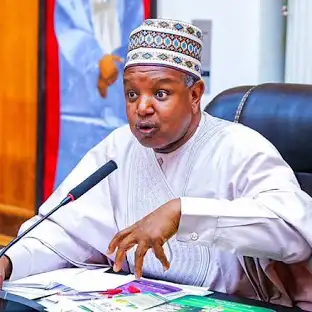As President Bola Ahmed Tinubu approaches his second year in office, Minister of Budget and Economic Planning, Senator Abubakar Atiku Bagudu, says Nigeria’s economic reforms are beginning to yield measurable results, earning both local and international recognition.
In a statement issued Thursday by Special Adviser to the President on Information and Strategy, Bayo Onanuga, Bagudu described Nigeria’s economy as being on a recovery path, citing improved macroeconomic indicators and renewed investor confidence.
“There is a growing appreciation of Nigeria’s economy globally,” Bagudu said in an interview for an upcoming TV documentary marking President Tinubu’s two-year milestone. “We have recorded four consecutive quarters of economic growth and seen increasing stability in the foreign exchange market.”
The minister attributed these gains to what he called “bold and necessary” policy reforms initiated by President Tinubu, particularly the removal of fuel subsidies and the unification of the foreign exchange market. He acknowledged the short-term pain the policies may have caused but insisted they were essential for long-term national prosperity.
“We were losing 5% of our GDP on fuel subsidy—money going to just a few,” Bagudu stated. “The foreign exchange reform removed uncertainty and favouritism. We now have a fair market—willing buyer, willing seller—which has generated revenue growth and boosted private sector confidence.”
Bagudu said global ratings agencies have taken note of Nigeria’s fiscal discipline and policy direction, especially as reflected in the 2024 and 2025 national budgets.
“The 2024 budget achieved significant deficit reduction, and more importantly, it showed that we are serious—and the markets believed us,” he explained.
He also pointed to rising interest from investors in countries like Brazil, Belarus, and Saudi Arabia, especially in sectors such as agriculture, energy, and infrastructure.
“Investors want to see good policy—can I get paid back? Are the numbers credible? Is the environment transparent? That’s why they appreciate when they see quarterly GDP growth,” he said.
In a significant policy shift, Bagudu revealed that for the first time, Nigeria is selling crude oil in naira to local refiners—a move he described as a show of confidence in the domestic economy.
“Mr. President was courageous enough to allow crude sale in naira to our refiners. This is a testament to his belief in our economy,” he said.
Highlighting institutional respect, Bagudu praised President Tinubu’s adherence to central bank independence and his administration’s efforts to manage inherited debts, including the ₦22.7 trillion Ways and Means financing.
“That discipline is earning us credibility globally,” he noted.
The Minister also commended the coordination between the Presidential Economic Coordination Council and the Economic Management Team, led by Coordinating Minister for the Economy, Wale Edun.
“This is teamwork. The President is the chief coordinator. He understands the global economic context, and the private sector respects him,” he said.
Using a metaphor to describe the current economic phase, Bagudu said: “Our economy is like a body going to the gym. It might feel painful now, but the muscles of progress are forming.”
He concluded with a moral argument for the reforms: “Mr. President is saying: ‘I’m ready to take the pain so our children and grandchildren will inherit a more prosperous Nigeria.’ This isn’t just economic reform—it’s a moral responsibility.”



